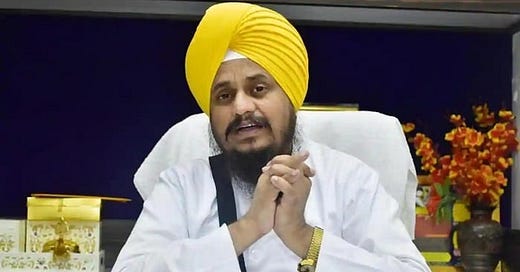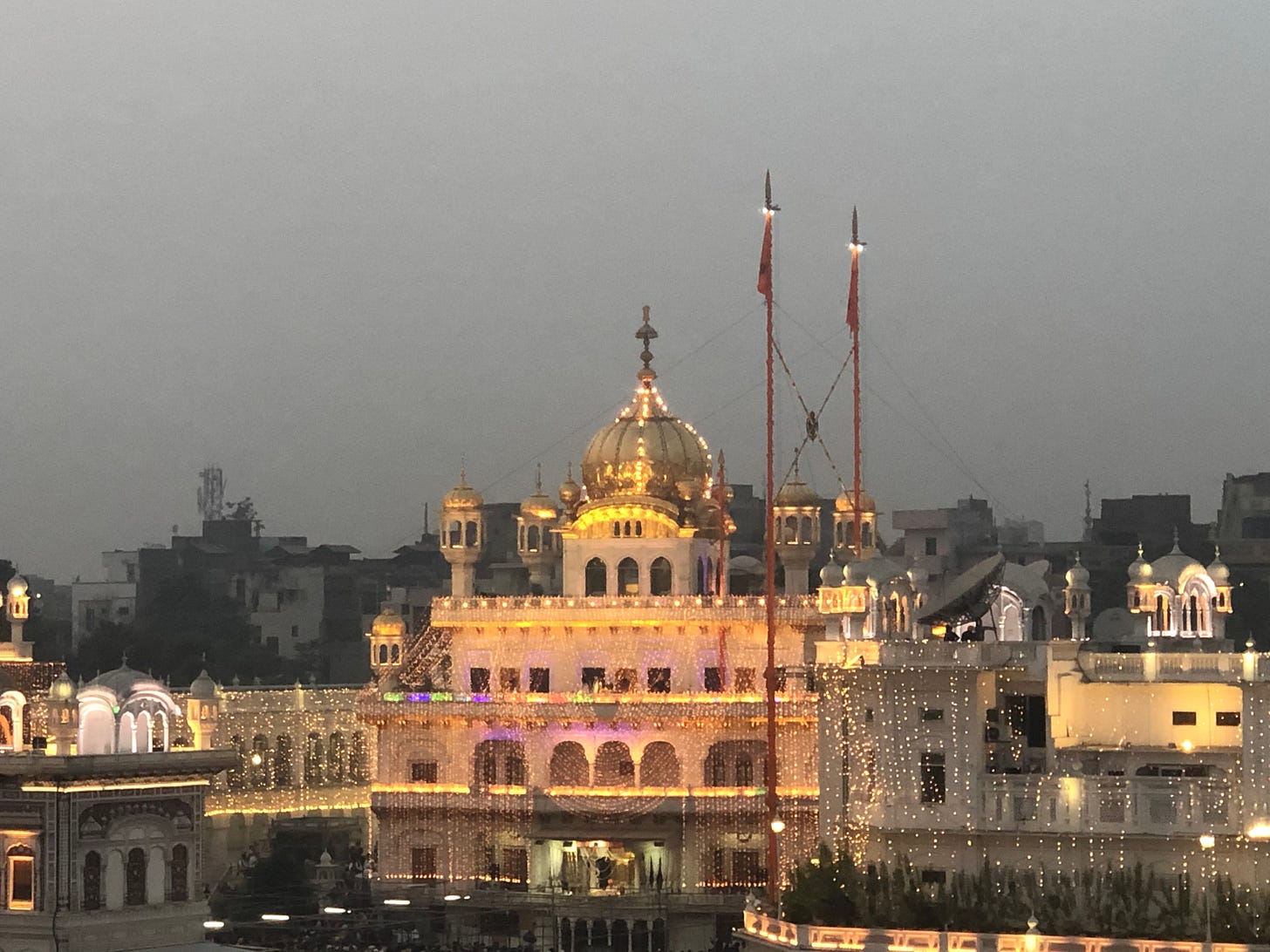Giani Harpreet Singh, Jathedar Takht Sri Damdama Sahib Resigns
As one the Five Singh Sahiban, led by the Jathedar of the Akal Takht, he was reportedly dissatisfied with the Shiromani Akali Dal and the SGPC's silence in the aftermath of the Valtoha episode.
Giani Harpreet Singh Resigns Unexpectedly
The sudden and unexpected resignation of Giani Harpreet Singh, the Jathedar of Takht Sri Damdama Sahib, has shaken the Sikh community. SGPC President Harjinder Singh Dhami confirmed receiving the resignation digitally via WhatsApp today afternoon and stated that he would consider taking action once the formal hard copy is received him him1. As one of the five Singh Sahiban, led by the Jathedar of Akal Takht, Giani Raghbir Singh, Giani Harpreet Singh’s departure comes at a particularly crucial moment. The five Singh Sahiban are currently deliberating on the imposition of religious punishment (tankhah) on Shiromani Akali Dal (SAD) President Sukhbir Singh Badal, who has already been declared a tankhaiya (guilty of religious misconduct).
Jathedar Akal Takht’s Directive and Ultimatum to the SGPC: Reject Resignation or Face Mass Resignations
In a significant development, the Jathedar of the Akal Takht has issued a video statement directing the SGPC to reject Giani Harpreet Singh's resignation. In the same message, he also made a personal appeal to Giani Harpreet Singh, urging him to reconsider and review his decision. Further escalating the situation, the Jathedar declared that if the resignation is not declined, all the other Singh Sahiban will also tender their resignations. This directive, coming just minutes after the publication of our article, has plunged Sikh affairs into an even deeper crisis. The Jathedar’s stern warning now places immense pressure on the SGPC President, Harjinder Singh Dhami, to act decisively. The manner in which the SGPC handles this situation will be a litmus test for its leadership and could ultimately shape Dhami’s legacy, determining whether the SGPC can navigate this turbulent moment with integrity and unity.
Giani Harpreet Singh’s resignation follows just one day after the Singh Sahiban directed the SAD to expel ex-MLA Virsa Singh Valtoha for 10 years over his public remarks, widely perceived as a thinly veiled attack on the Akal Takht's authority. Valtoha, facing expulsion, chose to voluntarily resign from the primary membership of the SAD the same evening, further intensifying an already volatile situation. The timing of Giani Harpreet Singh’s resignation has raised serious concerns about the cohesion of Sikh religious and political leadership, highlighting the growing tension between religious and political forces within the Sikh community, as well as the strained relations between the SGPC and some of the Jathedars.
Giani Harpreet Singh's Resignation: A Setback for the Sikh Religious Leadership
A Leadership Vacancy at a Critical Time
The resignation of Giani Harpreet Singh as the Jathedar of Takht Damdama Sahib has created a significant leadership vacuum within one of the five key seats of Sikh authority. His departure comes at a particularly sensitive moment, with the Sikh community already struggling with internal divisions and a perceived lack of clear direction from its main religious institutions. This is not merely a routine resignation but a powerful expression of discontent with the current state of Sikh religious affairs. It reflects Giani Harpreet Singh’s deep disappointment, if not frustration, particularly with the Shiromani Akali Dal (SAD) and the Shiromani Gurdwara Parbandhak Committee (SGPC), two bodies whose role he has implicitly criticised.
Criticism of SAD and SGPC: Exposing Political Influence
Giani Harpreet Singh's resignation is especially significant due to his criticism of both the SAD and the SGPC, institutions that have long claimed to represent Sikh interests but are increasingly viewed with scepticism. These bodies have come under fire for their perceived politicisation of Sikh religious leadership, particularly with their deafening silence in the wake of Virsa Singh Valtoha’s irresponsible and reprehensible remarks further tarnishing their reputations. Giani Harpreet Singh’s resignation reveal a deepening crisis of credibility within these organisations, particularly their undermining of the independence of Sikh religious institutions by allowing political agendas to intrude on spiritual as well as temporal matters. His departure is likely to accelerate the erosion of public trust in the SAD and SGPC, both of which are already facing mounting challenges in maintaining their moral, religious and administrative duties.
The Valtoha Controversy: An Unforgivable Misstep
Valtoha's Unjust Criticism of Akal Takht
Virsa Singh Valtoha’s recent outburst on social media, where he publicly questioned the delay in the religious punishment (tankhah) for SAD leader Sukhbir Singh Badal, was an irresponsible and reckless act. By insinuating that the Akal Takht Jathedar was acting under external pressures, Valtoha directly challenged the sanctity and independence of the highest Sikh authority. His comments were not only ill-timed but also an affront to the dignity of the Akal Takht, which has historically stood above political manipulation. The community's reverence for the Akal Takht cannot be overstated, and Valtoha’s actions were a blatant disrespect to this sacred institution.
Unsubstantiated Allegations: Political Manipulation Exposed
Valtoha's claims that the Union government, BJP, RSS, and overseas Sikhs were pressuring the Sikh clergy only exacerbated the situation. These allegations, lacking any substantive evidence, appeared to be more of a politically motivated attack than a genuine concern for the well-being of the Sikh panth. By bringing such allegations into the public sphere without proof, Valtoha not only discredited himself but also brought unnecessary turmoil to the Sikh community. His failure to provide evidence when summoned by the Akal Takht further exposed the baselessness of his claims, leading to his expulsion from the Shiromani Akali Dal.
Voluntary Resignation: A Hollow Gesture
In what appeared to be an attempt to save face, Valtoha resigned from the SAD just before his formal expulsion could be executed. While this may have been intended to prevent further embarrassment for the party, it was a hollow gesture that failed to mitigate the damage already done. His actions serve as a cautionary tale for political figures who overstep their bounds in attempting to influence religious decisions. Valtoha’s misstep has highlighted the dangers of conflating political ambitions with religious authority, a lesson that the Sikh community and its leaders must heed moving forward.
The Role of Sukhbir Badal: A Mild Reprimand
The Delay in Punishment: A Cause for Concern
While much of the focus has been on Valtoha’s reckless behaviour, it is also important to consider the role of Sukhbir Singh Badal in this controversy. The delay in the pronouncement of his religious punishment has raised questions about his own influence within the SAD and SGPC. Although Sukhbir Badal has maintained a respectful distance from directly interfering with the Akal Takht, the lingering suspicion that his political stature might be stalling the religious process has not gone unnoticed.
Badal’s Silence: A Missed Opportunity
Sukhbir Badal’s silence on the matter, though likely calculated, can also be seen as a missed opportunity to reaffirm the independence of the Akal Takht. By not actively addressing the concerns surrounding the delay in his punishment, he has allowed space for critics like Valtoha to sow confusion and mistrust within the Sikh community. This has even led to lingering suspicions that Valtoha may have been acting on Sukhbir’s behalf. A more proactive approach from Badal, openly expressing his confidence in the Akal Takht’s processes, could have mitigated much of the controversy and strengthened the perception of the Akal Takht as the supreme religious authority.
SGPC and SAD: Institutions in Crisis
Erosion of Public Trust
The events surrounding both Valtoha and Giani Harpreet Singh’s resignation have cast a spotlight on the SGPC and SAD, institutions once regarded as the pillars of Sikh leadership. Their failure to maintain a clear separation between religious and political roles has eroded public trust, leading to increasing calls for reform. The SGPC, in particular, has been criticised for its management of Sikh gurdwaras and for allowing political interests to overshadow religious duties.
A Call for Reform
The resignation of Giani Harpreet Singh and the Valtoha controversy should serve as a wake-up call for the SGPC and SAD to undertake meaningful reforms. There is a growing demand within the Sikh community for transparency and accountability in how Jathedars are appointed and how decisions are made. The intertwining of political agendas with religious authority has weakened these institutions, and the time has come for a separation of powers that preserves the sanctity of Sikh religious leadership.
The Akal Takht: A Pillar of Strength Amidst the Chaos
The Reverence for the Akal Takht
Despite the turmoil caused by political figures, the Akal Takht has emerged from this controversy with its integrity intact. Led by the five Singh Sahiban, the Akal Takht continues to stand as the supreme authority in Sikh spiritual and temporal matters. The Sikh community’s unwavering reverence for the Akal Takht has shielded it from the negative fallout of these controversies, reaffirming its role as the guiding light for the Panth. This sacred institution remains above the political fray, commanding respect and providing the moral and spiritual leadership that the Sikh community looks to in times of uncertainty.
Time Ripe for SGPC Elections
The time is now ripe for the general elections of the Shiromani Gurdwara Parbandhak Committee (SGPC), which were last held in 2011. After numerous extensions, the final date for the registration of eligible Sikh voters expired on 16th September, as confirmed by the Sikh Gurdwara Election Commission. With the Gram Panchayat elections concluded and the Punjab Vidhan Sabha by-elections scheduled to finish by 23rd November, the stage is set for the much-needed SGPC elections. While the law allows the current body to continue until a new one is constituted, it can be argued that the present SGPC is no longer fully representative. Sikh youth who have turned 21 since the last elections have been deprived of their right to elect their statutory body to manage the Sikh gurdwaras. A new general house would be far more representative of the current Sikh community and reflect the evolving sentiments of the wider Sikh sangat.
Furthermore, it would elect a new Executive Committee responsible for the statutory appointment of the Jathedars, including the Jathedar of the Akal Takht. The onus now lies on both the Punjab Government and the Sikh Gurdwara Election Commission to expedite the election process, ensuring that the Sikh community’s leadership remains current and representative.
Conclusion: A Time for Introspection, Renewal and Democracy
The resignation of Giani Harpreet Singh and the controversy surrounding Virsa Singh Valtoha have exposed deep fissures within Sikh leadership. While the Akal Takht, as the highest seat of Sikh authority, remains untarnished by these controversies, the SAD and SGPC find themselves at a critical crossroads. Political figures must now reflect on their actions and recognise the imperative of keeping religious authority distinct from political ambitions. The growing demand for fresh general house elections of the SGPC further underscores the need for a more representative leadership that genuinely reflects the sentiments of the Sikh community. The Sikh community, with its deep reverence for the Akal Takht, will continue to look to this institution for guidance, but the time has come for substantial reforms within the SAD and SGPC to restore public trust and uphold the sanctity of Sikh religious governance2.
In a significant turn of events, SGPC President Harjinder Singh Dhami officially rejected the resignation of Giani Harpreet Singh after a detailed discussion with him about the ongoing situation. Advocate Dhami reassured Giani Harpreet Singh that the Sikh community stands united in facing any challenges ahead. This move reinforces the support for Giani Harpreet Singh within the SGPC and aligns with the earlier directive from Akal Takht Jathedar Giani Raghbir Singh, who had urged that the resignation not be accepted.
The decision is expected to have far-reaching implications for the stability of Sikh religious institutions and may help diffuse the recent tensions that arose following the resignation attempt.
The Controversy Surrounding ex-MLA Virsa Singh Valtoha Qua the Akal Takht: A Cautionary Tale
Virsa Singh Valtoha’s Avoidable Remarks: A Cautionary Tale






